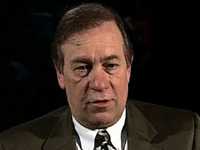|
"I said, ‘Well, I can feel it.’ And he said, ‘Why don’t you look?’ And I looked and I said, ‘Nope, it’s not there.’ And he said, ‘That’s what they call phantom pains.’" (Video Interview, 28:49)
|
|
{
align: 'left'
}
|
James M. Mayer |

James Mayer [2003] | Vietnam War, 1961-1975
Army
25th Infantry Division
Vietnam
Specialist
MO
 |
|
 |
James Mayer graduated from college in his native Missouri in 1968 and decided to enlist in the Army before he would inevitably be drafted. He received orders for Vietnam in January 1969 as part of the 25th Infantry Division. He was confident he’d escape without injury—until a man 15 feet away from him died in a firefight. Two months into his tour, he stepped on a land mine. In such shock that he felt no initial pain, he could see how badly mangled his legs were. Both were amputated below the knee. Mayer praises the medical treatment he received during his long recovery. Early on, he told a nurse he was so happy just to survive that he was going to throw an Alive Day Party every April 25th, the day he was injured. Mayer came home to become an advocate for veterans, working for both the VA and the Paralyzed Veterans of America.
|
|

